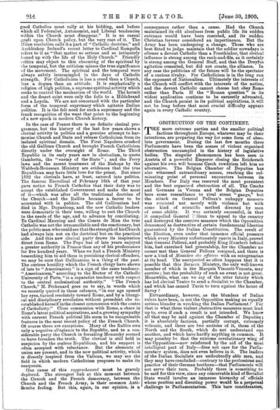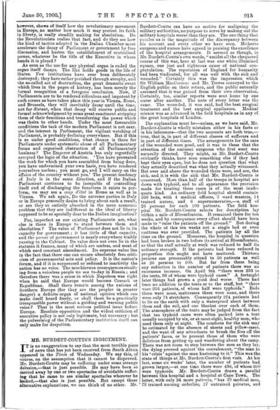OBSTRUCTION ON THE CONTINENT.
THE more extreme parties and the smaller political factions throughout Europe, whatever may be their intentions, are preparing the way for some form of abso- lute government. During the last few months three Parliaments have been the scenes of violent organised obstruction unexampled in the history of legislative bodies. The singular phenomenon has been seen in Austria of a powerful Emperor closing the Reichsrath against his own will because Czech rowdyism left him no alternative. The Belgian Chamber of Deputies has also witnessed extraordinary scenes, reaching the cul- minating point of personal encounters between its Members. For Italy was reserved the most persistent and the best organised obstruction of all. The Czechs and Germans in Vienna and the Belgian Deputies bore some resemblance to rival street "gangs," but the attack on General Pelloux's unhappy measure was executed not merely with violence but with some kind of scientific method directed by men of some ability. It was certainly successful, in that it compelled General lloux to appeal to the country and destroyed the coercive measure which the Opposition denounced as destructive of certain fundamental liberties guaranteed by the Italian Constitution. The result of the Election, even under that immense official pressure which every Ministry unfortunately exerts in Italy, proved that General Pelloux, and probably King Humbert behind him, had exercised bad generalship, for the Chamber no sooner met than General Pelloux resigned, and there is now a kind of ifinistere des affaires with an octogenarian at its head. The unexpected so often happens that it is possible that this Saracco Ministry, the only well-known member of which is the Marquis Visconti-Venosta, may. survive ; but the probability of such an event is not great. Meanwhile, what can we say of the utter fatuity which has led clerical Venice to send a Socialist to the Chamber, and which has caused Turin to turn against the house of Savoy ?
Extraordinary, however, as the blunders of Italian rulers have been, is not the Opposition making an equally serious blunder in wrecking the Italian Parliament ? For that is what these violent obstructive measures must lead up to, even if such a result is not intended. We know all that may be said against the Chamber of Deputies ; it is absolutely factious, partially corrupt, extremely volcanic, and there are two sections of it, those of the North and the South, which do not understand one another, and which have hardly anything in common. It may possibly be that the extreme revolutionary wing of the Opposition—now reinforced by the aid of the most intelligent part of Italy—does not care for the Parlia- mentary system, does not even believe in it. The leaders of the Italian Socialists are undoubtedly able men, and they may have concluded—contrary to the professions and practice of their German brethren—that Parliaments will not serve their turn. Probably there is something to be said for this view, since any conceivable kind of Socialist State would involve an immense hierarchy of officials whose position and directing power would be a perpetual challenge to Parliamentarism. This bare consideration; however, shows of itself how the revolutionary movement in Europe, no matter how much it may protest its faith in liberty, is really steadily making for absolutism. Do the Revolutionists realise that fact, and do they see how the kind of tactics adopted in the Italian Chamber must accelerate the decay of Parliament or government by free discussion, and hasten the establishment of centralised power, whatever be the title of the Executive in whose hands it is placed ?
As soon as the use for any physical organ is ended the organ itself decays. The like holds goods in the life of States. Few institutions have ever been deliberately destroyed ; they have rather perished through atrophy, and the so-called act of destruction, the great dramatic event which lives in the pages of history, has been merely the formal recognition of a foregone conclusion. Now, if Parliaments are to be rendered ridiculous and impotent by such scenes as have taken place this year in Vienna, Rome, and Brussels, they will inevitably decay until the time, not far distant, when that decay will receive public and formal acknowledgment by some great enactment stripping them of their functions and transferring the power which was theirs to other hands. Under the most favourable conditions the task of the modern Parliament is not easy, and the interest in Parliament, the vigilant watching of Parliament, is probably declining everywhere. But if this is so under good conditions, what chance is there for Parliaments under systematic abuse of all Parliamentary forms and organised obstruction of all Parliamentary business ? The Emperor of Austria has only regretfully accepted the logic of the situation. 'You have prevented the work for which you have assembled from being done, you have undermined your own basis, you have rendered yourselves useless ; you must go, and I will carry on the affairs of the country without you.' The present tendency of Italy is in the same direction, and if the Italian Parliament continues to be incapable of controlling itself and of discharging the functions it exists to per- form, we may see a coup eV Hat in Rome as well as in Vienna. We ask again, Do the extreme parties in Italy or in Europe generally desire to bring about such a result, or are they so entirely absorbed in the mere economic problem that they are indifferent to the ideal of liberty supposed to be so specially dear to the Italian imagination?
For, imperfect as our existing Parliaments are, what else is there in Europe to stand between them and absolutism ? The value of Parliament does not lie in its capacity for government ; it has little of that capacity, and the power of government is nearly everywhere visibly passing to the Cabinet. Its value does not even lie in the statutes it frames, many of which are useless, and most of which need constant amendment. Its supreme value lies in the fact that there one can secure absolutely free criti- cism of governmental acts and policy. It is the nation's forum, and if it is suppressed or reduced to inactivity the nation has no voice. The mischievous consequences result- ing from a voiceless people we see to-day in Russia ; and therefore there was a sense in which Napoleon was right when he said that Europe would become Cossack or Republican. Shall there remain among the nations of Southern Europe (for they are the peoples in greater danger) a definite organ of national opinion which can make itself heard freely, or shall there be a practically irresponsible power without a guiding and warning public voice ? That is the most serious political issue before Europe. Resolute opposition and the widest criticism of executive policy is not only legitimate, but necessary ; but the pulverising of the Parliamentary institution itse!f can only make for despotism.



















































 Previous page
Previous page